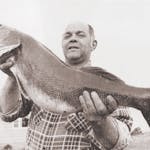 See
more of the story
See
more of the story
"That night we cooked a delicious duck and caribou stew, the likes of which you could never duplicate in the fanciest restaurant. The taste included campfire smoke and the spice of the vast land: the moodiness of the lake, the strength of the timbered ridges, and the uncertainty of the boggy muskeg."
— Shell Taylor
Geoffrey Pope might be the grittiest Minnesota camper you never heard of.
At 9 a.m. on April 25, 1936, he and a pal, the above quoted Shell Taylor, bored by their jobs as bookkeepers, clambered into a 17-foot canoe at the foot of 42nd St. in New York City, and set out for the elusive Northwest Passage en route to Nome, Alaska.
Spending the winter of 1936-37 in Canada's Northwest Territories, the pair waited for spring breakup. Then they paddled the Mackenzie and Yukon rivers en route to the Bering Sea, and from there along the Alaska coast to Nome, arriving in that village on Aug. 11, 1937.
Pope was 23 years old.
The journey, during which the two men hunted and fished for most of their food, was the longest canoe and camping adventure accomplished to that date: 7,165 miles.
That Pope hailed from Minnesota — he graduated from Minneapolis West High School — was perhaps no accident. For centuries this state has incubated a who's-who of world-class outdoor adventurers, thanks in large part to the close ties Minnesotans historically have had to their lakes, rivers, forests and prairies.
David Carson, 55, is also an adventurer.
In 2020, he participated twice in an introductory camping program sponsored by Three Rivers Park District, which features more than 27,000 acres of parks and trails in suburban Hennepin, Carver, Dakota, Scott and Ramsey counties.
Three Rivers sponsors the growing camping program, started in 2020, specifically for people who for financial reasons or lack of tradition might not use the park system. This includes Black, Indigenous and people of color, and other infrequent Three Rivers users.
"I've always been interested in nature," said Carson, who is Native American. "I grew up in the projects and my friends and I would catch crawfish in a nearby lake. Also, there were always koi fish in Loring Lake, in downtown Minneapolis. I'd catch them and bring them home. I'm the type of person who stops while driving down a road to move a turtle out of the way of traffic."
But Carson had never camped alone before he showed up for an overnight in a tent at Baker Park Reserve on Lake Independence.
On hand was a park liaison who presented Carson with his camping "kit," which included a tent and nearly everything else needed for his adventure.
"Right down to skewers for marshmallows," he said. "It was really cool. The experience was good."
Minnesotans have a stake in ensuring that Carson and others who haven't been exposed to outdoor activities — perhaps camping especially — have a chance to participate.
Numerous studies have shown that people's mental and physical well-being improve when exposed to natural areas and nature-based activities.
Camping is considered especially therapeutic. For adults and kids alike, it provides opportunities for experiential learning and problem-solving among multiple generations of families and friends, while also helping people sleep well, exercise rigorously and boost their intake of vitamin D, due to increased sun exposure.
The Department of Natural Resources (DNR) also has an introductory camping program. Unveiled in 2010, the initiative is called "I Can Camp!"
"Responses to our 'I Can Camp!' program run along the lines of, 'This is crazy fun,' " said Eric Pelto, a DNR special programs coordinator. "The participants enjoy it, in part because we set them up for success. We don't do anything for them. But our staff is on site to ensure they get their tent set up and their fires built. I would say 99% of them have smiles on their faces soon after arriving."
Sparking interest in outdoors recreation isn't the only goal of the DNR and Three Rivers productions. The programs also are attempts to ensure that, in coming years, Three Rivers has enough visitors to keep its parks open, and that the DNR has a critical mass of citizen-customers to serve.
As the state has become increasingly urbanized (78% of Minnesota's population growth from 2010-2020 was in the metro) and diverse (about 40% of Ramsey County residents, for example, are people of color) significant participation declines in outdoors activities are possible, if not probable.
Such falloffs — whether due to busy city lifestyles, increases in single-parent families, low incomes and/or inabilities to access outdoors recreation opportunities — could trigger corresponding cutbacks of natural resource management, which traditionally have been funded by participants' license and permit purchases.
Since the 1960s, Minnesota baby boomers, most of them white, who hunt, fish and otherwise recreate outdoors have largely underwritten the state's natural resource management through license purchases.
But fewer among Boomers' follow-on generations hunt and fish, and participation among minorities is even lower: About 30% of white Minnesotans fish, for example, but only about 11% of minorities do.
And while minorities are projected to make up about a quarter of Minnesota's population by about 2035, a recent survey showed they represent only about 5% of state park visitors.
Such disparities necessarily have social consequences, believes Richard Louv, author of "Lost Child in the Woods: Saving Our Children From Nature Deficit Disorder."
"Basically, the idea is that biologically we are still hunters and gatherers and we need, at some level we don't fully understand, direct involvement in nature," Louv told NPR. "We need to see natural shapes in the horizon. And when we don't get that, we don't do so well."
"We don't do so well'' is one way to describe Minnesota in recent years, when measured by political divisions, economic inequalities and social unrest — the root of which, in some instances, is racism.
Would further expanding people's opportunities to interact with nature, especially while camping, be one solution?
It certainly worked well for Geoffrey Pope, whose Minnesota upbringing led him to a lifetime of adventures, including a failed attempt at age 76 to cross the Atlantic in his 50-foot Civil War-era topsail ketch.
David Carson, the camping-newcomer-turned-camping-advocate, thinks outdoor experiences can benefit everyone.
"Walking around a concrete jungle all day, never having an opportunity to put your feet in dirt, that's no good," he said. "I believe in some ways we're all connected to nature, and when you are, you have a different outlook on life."





